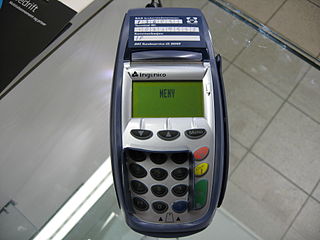
The point of sale (POS) or point of purchase (POP) is the time and place where a retail transaction is completed. At the point of sale, the merchant calculates the amount owed by the customer, indicates that amount, may prepare an invoice for the customer, and indicates the options for the customer to make payment. It is also the point at which a customer makes a payment to the merchant in exchange for goods or after provision of a service. After receiving payment, the merchant may issue a receipt for the transaction, which is usually printed but can also be dispensed with or sent electronically.
Heartland Payment Systems, Inc. is a U.S.-based payment processing and technology provider. Founded in 1997, Heartland Payment Systems' last headquarters were in Princeton, New Jersey. An acquisition by Global Payments, expected to be worth $3.8 billion or $4.3 billion. was finalized on April 25, 2016.

A data breach is a security violation, in which sensitive, protected or confidential data is copied, transmitted, viewed, stolen or used by an individual unauthorized to do so. Other terms are unintentional information disclosure, data leak, information leakage and data spill. Incidents range from concerted attacks by individuals who hack for personal gain or malice, organized crime, political activists or national governments, to poorly configured system security or careless disposal of used computer equipment or data storage media. Leaked information can range from matters compromising national security, to information on actions which a government or official considers embarrassing and wants to conceal. A deliberate data breach by a person privy to the information, typically for political purposes, is more often described as a "leak".
Credit card fraud is an inclusive term for fraud committed using a payment card, such as a credit card or debit card. The purpose may be to obtain goods or services or to make payment to another account, which is controlled by a criminal. The Payment Card Industry Data Security Standard is the data security standard created to help financial institutions process card payments securely and reduce card fraud.
A supply chain attack is a cyber-attack that seeks to damage an organization by targeting less secure elements in the supply chain. A supply chain attack can occur in any industry, from the financial sector, oil industry, to a government sector. A supply chain attack can happen in software or hardware. Cybercriminals typically tamper with the manufacturing or distribution of a product by installing malware or hardware-based spying components. Symantec's 2019 Internet Security Threat Report states that supply chain attacks increased by 78 percent in 2018.
Dexter is a computer virus or point of sale malware which infects computers running Microsoft Windows and was discovered by IT security firm Seculert, in December 2012. It infects PoS systems worldwide and steals sensitive information such as Credit Card and Debit Card information.
Identity theft involves obtaining somebody else's identifying information and using it for a criminal purpose. Most often that purpose is to commit financial fraud, such as by obtaining loans or credits in the name of the person whose identity has been stolen. Stolen identifying information might also be used for other reasons, such as to obtain identification cards or for purposes of employment by somebody not legally authorized to work in the United States.
Backoff is a kind of malware that targets point of sale (POS) systems. It is used to steal credit card data from point of sale machines at retail stores. Cybercriminals use Backoff to gather data from credit cards. It is installed via remote desktop type applications where POS systems are configured. It belongs to the POS malware family as it is known to scrape the memory of POS devices.

Point-of-sale malware is usually a type of malicious software (malware) that is used by cybercriminals to target point of sale (POS) and payment terminals with the intent to obtain credit card and debit card information, a card's track 1 or track 2 data and even the CVV code, by various man-in-the-middle attacks, that is the interception of the processing at the retail checkout point of sale system. The simplest, or most evasive, approach is RAM-scraping, accessing the system's memory and exporting the copied information via a remote access trojan (RAT) as this minimizes any software or hardware tampering, potentially leaving no footprints. POS attacks may also include the use of various bits of hardware: dongles, trojan card readers, (wireless) data transmitters and receivers. Being at the gateway of transactions, POS malware enables hackers to process and steal thousands, even millions, of transaction payment data, depending upon the target, the number of devices affected, and how long the attack goes undetected. This is done before or outside of the card information being (usually) encrypted and sent to the payment processor for authorization.
Alina is a Point of Sale Malware or POS RAM Scraper that is used by cybercriminals to scrape credit card and debit card information from the point of sale system. It first started to scrape information in late 2012. It resembles JackPOS Malware.
FastPOS is a variant of POS malware discovered by Trend Micro researchers. The new POS malware foregrounds on how speed the credit card data is stolen and sent back to the hackers.
PunkeyPOS is a new type of Point of Sale Malware which was recently discovered by PandaLabs. This new Point of Sale Malware infects the Point of Sale(POS) Systems with two types of malware applications - keylogger and RAM Scraper. PunkeyPOS gets installed into the computer automatically without the knowledge of the user, in a similar manner as other POS malware.
A new sophisticated point-of-sale or memory-scraping malware called "Multigrain" was discovered on April 17, 2016 by the FireEye Inc. security company. Multigrain malware comes under the family of NewposThings Malware. This malware is similar to the NewposThings, FrameworkPOS and BernhardPOS malware which were known previously as notorious malware.
CenterPOS is a point of sale (POS) malware discovered Cyber Security Experts. It was discovered in September 2015 along with other kinds of POS malware, such as NewPOSThings, BlackPOS, and Alina. There are two versions which have been released by the developer responsible: version 1.7 and version 2.0. CenterPOS 2.0 has similar functionality to CenterPOS version 1.7. The 2.0 variant of CenterPOS malware added some more effective features, such as the addition of a configuration file for storing information in its command and control server.
Malumpos is a point of sale malware that are designed to steal or scrape customer’s credit and debit card detail from point of sale system. These are designed in a way that it records point of sale’s data which is running in an Oracle MICROS payment system of the restaurant. The collected data has been used in 333,000 customer sites around the world. Malumpos Malware targets hotels and other US businesses and put the retail customers at risk. This POS RAM Scraper is written in the Delphi programming language. Malumpos monitors, processes, scrapes the stolen data of the infected POS system and the RAM. First it stores the stolen credit or debit card details of the customer from the infected point of sale system once it is swiped. Then it sends the data to the cybercriminal to empty the customer bank balance or the details are sold to the black market.
Kasidet POS Malware is a variant of Point of Sale (POS) Malware that performs DDoS attacks using Namecoin's Dot-Bit service to scrape payment card details. It is also known as Trojan.MWZLesson or Neutrino and was found in September 2015 by cyber security experts. It is a combination of BackDoor.Neutrino.50 and the POS malware.
Data breach incidences in India were the second highest globally in 2018, according to a report by digital security firm Gemalto. With over 690 million internet subscribers and growing, India has increasingly seen a rise in data breaches both in the private and public sector. This is a list of some of the biggest data breaches in the country.
Web skimming, formjacking or a magecart attack is an attack where the attacker injects malicious code into a website and extracts data from an HTML form that the user has filled in. That data is then submitted to a server under control of the attacker.


